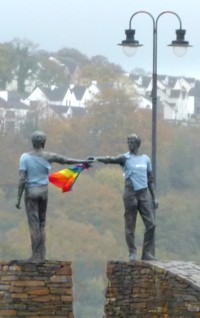The Irish Australian Diaspora
Some of the Irish unemployed who had fled to England turned to crime and some, who were not hanged for serious offences, were transported to Australia as convicts. Others with more resources, including a few Protestants, fled famine or economic distress in Ireland as free settlers.
Some of these Irish settlers would bring their sectarian grievances with them and pass them on to future generations, marking Australian political, religious and cultural life forever.
Perhaps the best record of this intergenerational sectarian enmity is the Jerilderie Letter dictated by Victorian bushranger Ned Kelly, to fellow gang member Joe Byrne, before a number of reliable witnesses, as his gang held up the NSW town of Jerilderie at gunpoint in 1879.
Both Kelly and Byrne were Australian born. Byrne's mother was one of some 4,000 'Irish Famine Girls' who were given free passages to Australia due to poverty or to their parents dying during the Great Famine.
Kelly's mother, Ellen, was Australian born. Ned's father, 'Red' Kelly, was an ex-convict who'd been transported from Tipperary for pig stealing in 1842.
'Red' like most Irish convicts was emancipated (given his freedom) after five years to follow a trade, as a bush carpenter, and he married Ellen two years later. The family 'selected' (took possession without title of) 88 acres of farmland in Victoria and had 8 children. Red drank heavily and died of alcoholic poisoning when Ned was 12. The family had a number of clashes with the law. At 14 Kelly became apprenticed to a local bushranger. His mother was notoriously uncivil to her neighbours and a suspected horse thief. Unlike Joe Byrne who'd been to school, Ned was illiterate and his religion; politics; and unusual version of history, were inculcated at his mother's knee.
But Ned had an imposing stature; was a natural leader and a gifted orator. His goal at Jerilderie was to have his entire 8,000 word 'manifesto' published.
|
The Jerilderie Letter (small indicative excerpt) ...Either ways a [an Irish] policeman is a disgrace to his country and ancestors and religion, as they were all Catholics before the Saxons and Cranmore yoke held sway since then they were persecuted massacred, thrown into martyrdom and tortured beyond the ideas of the present generation... source: National Museum of Australia |
After his execution Ned became a hero to many Irish Australians and his grievances would continue to be passed down, often in his name, to their descendants right into the 1950's. They were still evident when I was in Primary School when the kids from the small local Catholic (parochial) school, who were taught by Irish Nuns, would chant: 'Catholic, Catholic ring the bell Protestant, Protestant go to hell', at the drop of a hat. Sometimes it came to stone throwing.
After one incident my father told me that in Heaven there was a big high wall with the Catholics on one side and everyone else on the other - and the Catholics thought they were the only ones there. But I knew it was a joke. He'd taught Jewish and Catholic Poles to fly; didn't believe in Heaven or Hell; and said people should have whatever religion suited them.

